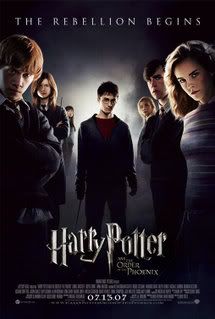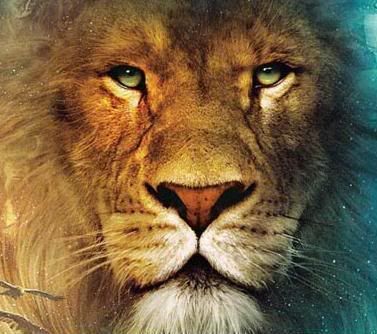
After a summer of movies filled with second, third, and fourth sequels, the most anticipated follow-up is finally here, and it is a fifth installment. Harry Potter and the Order of the Phoenix is the story of Year Five at Hogwarts for lead characters Harry, Hermione, and Ron, although a large portion of the movie occurs outside the grounds of the teens' school. More than a children's book, this episode builds upon strong themes of fear and friendship to create a solid piece of cinema. (Audio review.)
(Note: I have read only the first five books.)
Order of the Phoenix (OOTP) tracks the ongoing saga of the interactions between the dark Lord Voldemort and Harry Potter, who is aided by the titular order, a sort of wizard Joint Chiefs of Staff. Many in the wizarding community doubt Harry's story that Voldemort has returned, and the Ministry of Magic has it in for Dumbledore, all of which means that Harry feels more alone than ever, despite the presence of people and places he loves. As always with a movie adapted from popular literature, two questions must be answered. 1) Was it a good movie, and 2) Was it a good adaptation of the book? Pleasantly, the response to both questions is yes, though each affirmative requires unique qualification.
Having read the book, judging the movie strictly on its own merits is very difficult, because gaps on screen are filled in subconsciously by knowledge of the book. But this movie seems to succeed apart from those pages. Relatively unknown director David Yates keeps the story Harry-centric, giving it a brisk pace and making the main arc easy to follow, although a few other truncated storylines and characters will be enjoyed more by those who know them fully. Expanded motifs of Harry's anger and loneliness are expressed clearly but not heavy-handedly, through both pictures and the words of multiple characters. As was the case with the previous two installments, viewing this movie without first reading the book may result in confusion or at least a lesser understanding of everything, but having seen the first four movies will be plenty to let one comprehend this episode to an enjoyable extent.
The latter question is more complicated. Many people will complain about plot elements that vary from the book. Those objections are true but invalid. Maybe a beloved character was axed, tweaked, or minimized. Perhaps a treasured moment was omitted or included in a disappointingly disparate manner. Make no mistake about it; many things were altered. But when an 870-page tome is being condensed into a two hour and eighteen minute movie, cuts must be made. Much like time constraints demanded that The Lord of the Rings focus largely on Frodo at the expense of favorites like Tom Bombadil, this story must focus on Harry Potter. There are reasons that he is the title character. So no one gets to see Firenze teach or Ron and Hermione fight or anything about Quidditch or prefects. Looking objectively at the modifications though, the primary story arc does advance satisfactorily without those missing parts. Perhaps the galloping pace could have slowed to a canter, as the movie was indeed a rarity that could easily have been twenty minutes longer. But the purpose should then have been to expand upon the elements already in place rather than to add missing ones.
The more important goal is that the movie be faithful to the spirit of the book, and on that level, OOTP hits its mark. Prisoner of Azkaban displayed the world of wizards better than any other Potter movie because of two key inclusions: the little ways magic was used in the background and the fantastic scene-setting shots. Yates nearly recaptures Alfonso Cuaron's brilliance, approaching it with elements like kittens wandering around in pictures and spectacular zooms over Hogwarts. Of equal importance, he also executes small moments even better than the source material, wonderfully depicting simple enjoyments like laughter and friendship are a stark contrast to the lurking complex evil of You Know Who. These small interactions imbue the movie with a soul that adds substance and humanity to an adventurous and magical universe.
OOTP suffers slightly from middle-film-in-a-series syndrome, but in a good way. Much like The Two Towers or The Matrix Reloaded, one gets the feeling that it picks up and ends mid-story, with only a necessary modicum of resolution, as though setting the stage for something grand. That promise of something huge just ahead actually enhances the power of the movie. It leaves one desperately awaiting the next chapter more so than any other Potter movie. Harry Potter and the Half-Blood Prince, the next in the series, screams to be (re-)read before the seventh and final book is released next Saturday.
Ultimately, viewers who have not read the book should be able to follow along easily, and the movie should quench the appetites of fans with reasonable expectations. The gist of the book is explored in numerous ways, resulting in an experience that will leave one with a few thrills and chills, and a smile on one's face.
Bottom Line: A concise return to the spirit of the book, capturing the world with a proper dose of cinematic license. 7 of 10 for the second best movie in the series.
(Note: I have read only the first five books.)
Order of the Phoenix (OOTP) tracks the ongoing saga of the interactions between the dark Lord Voldemort and Harry Potter, who is aided by the titular order, a sort of wizard Joint Chiefs of Staff. Many in the wizarding community doubt Harry's story that Voldemort has returned, and the Ministry of Magic has it in for Dumbledore, all of which means that Harry feels more alone than ever, despite the presence of people and places he loves. As always with a movie adapted from popular literature, two questions must be answered. 1) Was it a good movie, and 2) Was it a good adaptation of the book? Pleasantly, the response to both questions is yes, though each affirmative requires unique qualification.
Having read the book, judging the movie strictly on its own merits is very difficult, because gaps on screen are filled in subconsciously by knowledge of the book. But this movie seems to succeed apart from those pages. Relatively unknown director David Yates keeps the story Harry-centric, giving it a brisk pace and making the main arc easy to follow, although a few other truncated storylines and characters will be enjoyed more by those who know them fully. Expanded motifs of Harry's anger and loneliness are expressed clearly but not heavy-handedly, through both pictures and the words of multiple characters. As was the case with the previous two installments, viewing this movie without first reading the book may result in confusion or at least a lesser understanding of everything, but having seen the first four movies will be plenty to let one comprehend this episode to an enjoyable extent.
The latter question is more complicated. Many people will complain about plot elements that vary from the book. Those objections are true but invalid. Maybe a beloved character was axed, tweaked, or minimized. Perhaps a treasured moment was omitted or included in a disappointingly disparate manner. Make no mistake about it; many things were altered. But when an 870-page tome is being condensed into a two hour and eighteen minute movie, cuts must be made. Much like time constraints demanded that The Lord of the Rings focus largely on Frodo at the expense of favorites like Tom Bombadil, this story must focus on Harry Potter. There are reasons that he is the title character. So no one gets to see Firenze teach or Ron and Hermione fight or anything about Quidditch or prefects. Looking objectively at the modifications though, the primary story arc does advance satisfactorily without those missing parts. Perhaps the galloping pace could have slowed to a canter, as the movie was indeed a rarity that could easily have been twenty minutes longer. But the purpose should then have been to expand upon the elements already in place rather than to add missing ones.
The more important goal is that the movie be faithful to the spirit of the book, and on that level, OOTP hits its mark. Prisoner of Azkaban displayed the world of wizards better than any other Potter movie because of two key inclusions: the little ways magic was used in the background and the fantastic scene-setting shots. Yates nearly recaptures Alfonso Cuaron's brilliance, approaching it with elements like kittens wandering around in pictures and spectacular zooms over Hogwarts. Of equal importance, he also executes small moments even better than the source material, wonderfully depicting simple enjoyments like laughter and friendship are a stark contrast to the lurking complex evil of You Know Who. These small interactions imbue the movie with a soul that adds substance and humanity to an adventurous and magical universe.
OOTP suffers slightly from middle-film-in-a-series syndrome, but in a good way. Much like The Two Towers or The Matrix Reloaded, one gets the feeling that it picks up and ends mid-story, with only a necessary modicum of resolution, as though setting the stage for something grand. That promise of something huge just ahead actually enhances the power of the movie. It leaves one desperately awaiting the next chapter more so than any other Potter movie. Harry Potter and the Half-Blood Prince, the next in the series, screams to be (re-)read before the seventh and final book is released next Saturday.
Ultimately, viewers who have not read the book should be able to follow along easily, and the movie should quench the appetites of fans with reasonable expectations. The gist of the book is explored in numerous ways, resulting in an experience that will leave one with a few thrills and chills, and a smile on one's face.
Bottom Line: A concise return to the spirit of the book, capturing the world with a proper dose of cinematic license. 7 of 10 for the second best movie in the series.
Edit: Oh yeah, like most all of the adult cast, Imelda Staunton rocks as Dolores Umbridge, worthy of hate mere seconds after appearing on screen.
Edit #2: Here's an interesting interview with Michael Goldenberg, the screenwriter who adapted the book.

1 comment:
Nice review, and fun to listen to you deliver it. I thought the movie was a strong 8 at least; shaky opening, but strong the rest of the way.
Post a Comment